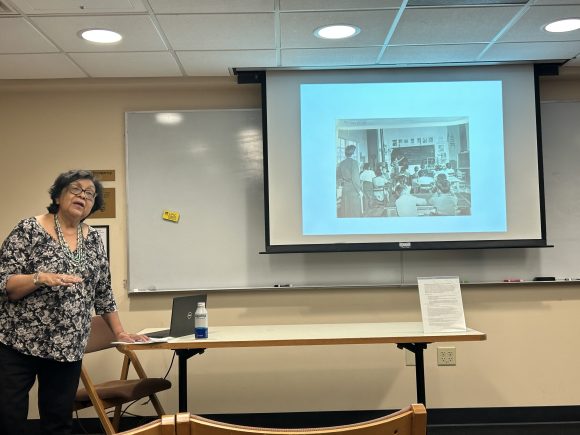
Jennifer Denetdale, chair of the Navajo Nation Human Rights Commission, alongside one of Milton Snow’s photographs on Feb. 21, 2023. (Ann Marie Vanderveen/CU Independent)
A University of Mexico professor held a presentation at the University Memorial Center on Tuesday, Feb. 21 about Milton Snow’s photographs of the Navajo Nation. They were taken following the U.S. government’s livestock reduction policies in the 1930s.
Jennifer Denetdale is a professor at the University of Mexico and chair of the Navajo Nation Human Rights Commission. The presentation was held in partnership with the Center for Native American and Indigenous Studies, the Center of the American West and the History Department.
“[The photographs] become points of storytelling; they become points about getting nostalgic for the past when a certain time period or era represented traditional teachings or traditional Navajo life,” said Denetdale.
In her introduction of Snow, Denetdale stated that his work numbered around 12,000 photographs. His collections are distributed across various places, such as the Navajo Nation Museum and the Arizona State University Library.
The 1934 Livestock Reduction Program executed by the federal government put restrictions and quotas on Navajo livestock. Given that livestock was integral to Navajo culture and lifestyle, this became a starting point for other western culture-inspired changes, according to Denetdale.
The subsequent integration of Anglo-American practices into Navajo life was documented by photographer Milton Snow, who was hired by the Department of Agriculture’s Soil Conservation Service. His job was to record the before and after images of conservation measures, like livestock reduction, in the Navajo Nation.
Andrew Cowell, a CU Boulder linguistics professor and faculty director of the Center for Native American and Indigenous Studies, introduced the event.
“At the end, she pointed out that just because someone only took certain kinds of photos or had an agenda, that doesn’t mean the photos aren’t valuable,” he said in an email statement to the CU Independent. “The Navajo people are ‘reading’ the photos in completely different ways from how you and I would read them and finding value in them.”
According to Denetdale, there is only one published dissertation that addresses Milton Snow’s photographs.
While these photographs were taken in the previous century, Denetdale said they caused her to think about recent issues harming the Navajo Nation, such as the devastation of COVID-19 on the community.
“As a historian, then, I look at the roots of what ails us in the present,” she stated.
According to Denetdale, the diminished infrastructure, economy and healthcare systems of the Navajo Nation from the American government’s historical policies targeting native tribes have worsened the impact of issues like COVID-19 today. The 1934 Livestock Reduction Program is an example of one of these policies.
“When you talk about the livestock reduction…we’re talking about the destruction of self-sustaining economy,” she said.
In her presentation of the photographs, Navajo people were depicted gathering at fairs, hosting baby pageants, learning in American classrooms and modeling as the typical nuclear family. This assimilation, pushed by the American government and displayed in Snow’s photographs, is a historical representation of the degradation of Navajo culture.
“And so [the photographs] were used to illustrate that Navajos were fast-embracing American ideas about work and about progress and about the nuclear family unit as the foundation of nation-building,” said Denetdale.
The importance of Denetdale’s photographic research in academia is its contribution to the field of photographic study. Gesturing to the audience, she said she would like to see more photographic research from students and professors. Her research of Snow’s work is now a part of the tribe’s history and documentation.
In terms of how the subjects of this historical research should be treated, Denetdale said, “We have an accountability and responsibility in our research to the people that we talk about, that we write about and that we connect with.”
Contact CU Independent Staff Writer Ann Marie Vanderveen at AnnMarie.Vanderveen@colorado.edu.
